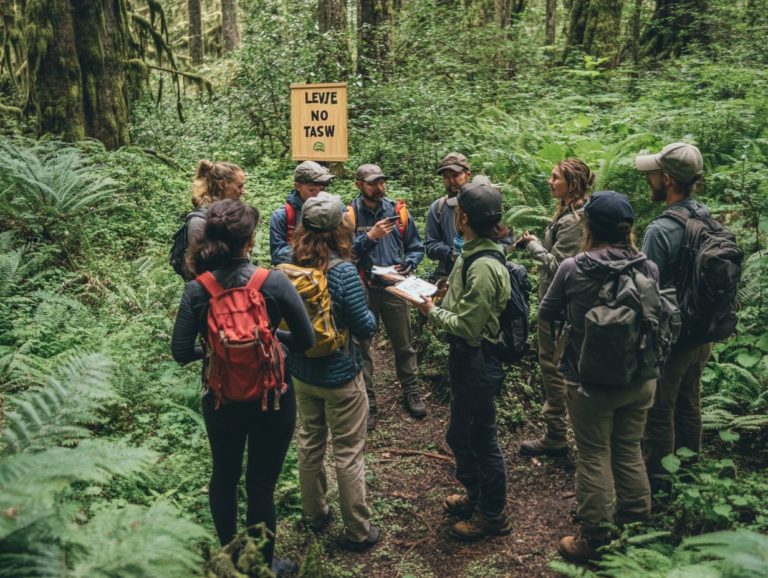How to Organize an Eco-Conscious Group Trip
Eco-tourism shows a strong commitment to preserving our planet while enjoying its natural beauty.
This guide will show you how to organize an eco-conscious group trip. We will start with a clear definition of eco-tourism and its many benefits, then move on to selecting the ideal destination.
Prepare to uncover practical tips for crafting a sustainable itinerary, securing eco-certified hotels that follow strict environmental standards, and minimizing your carbon emissions the pollution from travel.
You will also find activities that uplift local communities and gain insights into responsible tourism practices.
Start your eco-friendly adventure today! Protect our planet while having the time of your life!
Contents
- Key Takeaways:
- Choosing a Destination
- Planning and Preparation
- Transportation and Logistics
- Activities and Excursions
- Practicing Responsible Tourism
- Frequently Asked Questions
- What is an eco-conscious group trip?
- Why should I organize an eco-conscious group trip?
- How do I choose a destination for an eco-conscious group trip?
- What are some ways to reduce our environmental impact during the trip?
- How can I get others interested in joining an eco-conscious group trip?
- What should I do to ensure the trip is truly eco-conscious?
Key Takeaways:

- Choose a destination that aligns with your eco-conscious values by considering factors such as sustainable practices, conservation efforts, and community involvement.
- Create a sustainable itinerary by booking eco-friendly accommodations and minimizing your group’s carbon emissions through transportation choices and reducing waste.
- Practice responsible tourism by respecting local cultures and environments, supporting local businesses, and choosing eco-friendly activities that positively impact the community and environment.
Defining Eco-Tourism and its Benefits
Eco-tourism represents a responsible approach to travel, prioritizing sustainability while allowing you to immerse yourself in stunning natural environments with minimal environmental impact. This travel philosophy fosters a personal connection with nature and bolsters local economies through community engagement and eco-friendly practices.
The benefits are numerous, including the preservation of biodiversity, reduced carbon emissions through sustainable transportation choices, and support for eco-certified hotels and green restaurants committed to responsible tourism.
By embracing eco-tourism, you cultivate a deeper appreciation for the environment and gain awareness of the importance of preserving fragile ecosystems. This responsible travel model emphasizes transparency and accountability, encouraging meaningful engagement with local communities.
Through initiatives like wildlife conservation efforts and cultural exchanges, you can join the effort to preserve our planet and provide increased income for local populations, fostering community engagement.
Opting for eco-friendly activities like guided hikes led by indigenous guides or participation in conservation programs not only enriches your travel experience but also helps safeguard the well-being of the destinations you explore.
Choosing a Destination
When selecting a destination for sustainable travel, it s essential to conduct thorough research and consider eco-friendly practices carefully. Support the local economy and seek out eco-certified hotels that adhere to responsible tourism principles.
By doing so, you enhance your travel experience and contribute positively to the places you visit.
Factors to Consider for an Eco-Friendly Destination
When evaluating potential destinations for sustainable travel, keep an eye on key factors like how well the local economy supports eco-friendly initiatives, the environmental impact of tourism, and the transportation options that align with sustainable practices.
It’s crucial to consider how these destinations promote local artisans. Supporting their crafts preserves cultural heritage and bolsters the local economy.
As a traveler, assess the range of transportation options available, paying particular attention to public transit and low-emission vehicles to significantly reduce your carbon footprint.
Engaging with local communities allows for unique cultural experiences and insights, deepening your understanding of the area s ecological challenges and successes. Such interactions cultivate meaningful connections, enriching your travel experience and promoting responsible tourism that positively impacts both environmental and social sustainability.
Planning and Preparation
Planning your vacation well is key to a sustainable travel experience.
This requires careful planning. Consider camping tips, finding sustainable suppliers, and using eco-friendly practices to reduce waste.
Creating a Sustainable Itinerary

Creating a sustainable itinerary requires you to take a smart planning approach, seamlessly blending outdoor adventures with methods that help protect the environment to minimize your impact through responsible tourism.
Choose destinations that highlight local culture and prioritize environmental stewardship. Seek activities that promote real connections with local community efforts, like learning how to travel with a purpose. This supports local economies and gives you unique insights from residents.
Opt for guided hikes with eco-conscious operators or participate in wildlife conservation projects. This deepens your connection to nature and aligns with sustainable tourism principles. Consider using public transportation or biking to explore picturesque landscapes, reducing your carbon footprint along the way.
Combining these elements will craft an enriching experience that celebrates both adventure and sustainability.
Booking Eco-Friendly Accommodations
Choosing eco-certified hotels is a thrilling step towards sustainable travel! These accommodations not only prioritize eco-friendly practices but also contribute positively to the local economy while providing access to green restaurants.
When selecting where to stay, look for specific certifications like LEED, Green Key, or Travelife. These badges of honor indicate a true commitment to environmental stewardship. Additionally, understanding the importance of eco-conscious travel education can help you seek hotels that implement sustainable practices, from energy-efficient systems to water conservation programs and waste reduction initiatives.
It’s essential to support local businesses! Your choices can make a real difference in the community. Eco-friendly hotels often collaborate with nearby farms and artisans, ensuring that a larger portion of your spending benefits the community. By opting for eco-conscious lodging and dining choices, you not only reduce your carbon footprint but also engage in preserving the natural beauty and culture of the destinations you explore. For more tips on making your trip sustainable, check out this guide on how to plan an eco-conscious family vacation.
Transportation and Logistics
Transportation and logistics are pivotal in fostering sustainable travel. By thoughtfully selecting your transportation options, you can significantly lower carbon emissions and elevate your overall travel experience consider the benefits of traveling by train.
Minimizing Carbon Footprint
Minimizing your carbon footprint while traveling is crucial for responsible tourism. You can do this through mindful transportation choices, reducing your reliance on fossil fuels, and opting for eco-friendly travel methods, such as using public transit.
By prioritizing public transportation, you can significantly lower your carbon emissions. Buses, trains, and trams typically produce fewer emissions per passenger compared to private vehicles, making them a more sustainable option. Choosing eco-friendly vehicles, like electric or hybrid cars, can further bolster your sustainability efforts. It s also wise to plan your routes for maximum efficiency, avoiding unnecessary detours that waste fuel.
Choose shared rides and carpooling. This reduces your carbon footprint and builds a sense of community, enriching your travel experience while being kind to the planet and promoting community engagement.
Managing Waste and Resources
Managing waste and resources while traveling is essential for reducing your environmental impact. Embrace practices like using reusable items and cutting down on plastic waste throughout your journey.
You can truly make a difference by choosing eco-friendly accommodations that prioritize waste reduction and recycling programs. Additionally, learning how to plan a sustainable travel itinerary can enhance your trip’s positive impact. Opt for refillable water bottles instead of single-use plastics to significantly reduce your waste footprint.
Engaging with local communities provides valuable insights into their waste management initiatives, encouraging a more responsible approach to tourism. Participating in beach clean-ups or local recycling efforts benefits the environment and helps you forge a deeper connection with the destination.
By making conscious choices, you contribute to a collective effort toward sustainability, leaving a positive mark on the places you explore!
Activities and Excursions

Selecting activities and excursions that emphasize eco-friendly options is crucial for sustainable travel. Doing so allows you to enjoy enriching outdoor adventures while also engaging with the community and protecting local ecosystems.
Eco-Friendly Options and Impact on Local Communities
Eco-friendly activities have a profound impact on local communities by generating income and fostering engagement that strengthens the local economy. They promote sustainable practices and enhance tourism experiences.
Consider activities like guided nature tours, organic farm visits, and cultural workshops. These experiences not only immerse you in local culture but also create jobs and empower local artisans, while promoting biodiversity through eco-conscious travel.
By embracing these eco-friendly practices, you help preserve natural resources and encourage everyone to take care of the environment. Participating in community-led conservation efforts allows you to learn about local biodiversity while actively contributing to its protection.
Supporting local markets by purchasing handmade crafts or farm-fresh produce enhances your travel experience and ensures communities benefit from tourism, paving the way for a more sustainable future for everyone involved.
Practicing Responsible Tourism
Practicing responsible tourism is essential for preserving natural environments and minimizing your environmental impact. It’s important to act in ways that protect the destinations you visit and support local communities.
Embracing this mindset enhances your travel experience and ensures that the places you cherish remain vibrant and sustainable for future generations!
Respecting Local Cultures and Environments
Respecting local cultures and environments is key to responsible tourism. It fosters community engagement and ensures your positive contributions to the places you visit while minimizing your environmental impact.
By understanding and appreciating the unique traditions and ecosystems of your destinations, you can elevate your travel experiences and forge meaningful connections with local people. Engaging in cultural sensitivity means immersing yourself in local customs, participating in community events, and supporting local artisans and businesses.
Adopting eco-friendly practices like reducing waste, using sustainable transportation, and leaving natural habitats undisturbed plays a vital role in preserving the environment. These conscious actions enhance your travel experience and help protect the integrity of the destinations and their communities!
Frequently Asked Questions
What is an eco-conscious group trip?

An eco-conscious group trip is a travel experience planned to minimize negative impacts on the environment and promote sustainable practices.
Join the movement toward eco-friendly travel! Make conscious choices on your next journey to protect our planet and support local communities!
Why should I organize an eco-conscious group trip?
Organizing an eco-conscious group trip helps you travel while reducing harmful environmental impacts. It supports local communities and promotes awareness about sustainable travel choices.
How do I choose a destination for an eco-conscious group trip?
When picking a destination, consider the local environment and conservation efforts. Look for eco-friendly accommodations and activities to ensure sustainability.
What are some ways to reduce our environmental impact during the trip?
You can reduce your environmental impact on an eco-conscious group trip by using public transportation. Choose eco-friendly accommodations, avoid single-use plastics, and participate in beach or trail clean-ups.
How can I get others interested in joining an eco-conscious group trip?
Share your excitement for sustainable travel! Explain how an eco-conscious group trip benefits the planet and local communities. Invite others to join and help make a positive impact together!
What should I do to ensure the trip is truly eco-conscious?
To ensure an eco-conscious group trip, choose eco-friendly activities and accommodations. Minimize waste, use resources wisely, and support local businesses that promote sustainability.






